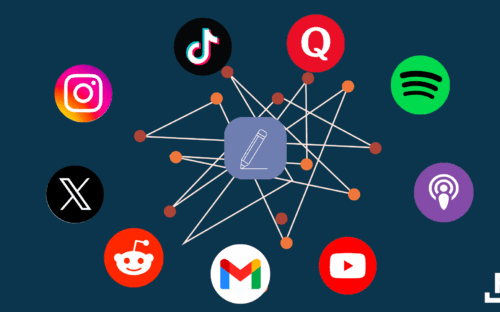Article's Content
In 2025 the search landscape is rapidly shifting toward AI-powered assistants. Users increasingly ask questions of ChatGPT, Google’s SGE, Perplexity, Claude, and similar platforms, rather than clicking through traditional SERPs.
For example, a recent survey found that 58% of consumers now turn to AI-powered search tools like ChatGPT and Perplexity for quick answers.
Industry reports echo this trend: Gartner predicts a 25% drop in traditional search volume by 2026 as generative engines take over.
In this new paradigm, Generative Engine Optimization (GEO) – the practice of optimizing content for AI answer engines – is essential.
Several tools in the market are already helping brands rank in AI tools, and that is why we are going to see which of these are the best. We are going to test and discuss the top 10 Best Generative Engine Optimization Tools for 2025.
10 Best Generative Engine Optimization Tools for 2025
The following SaaS platforms are leading the pack in helping brands optimize for AI search.
Each offers a unique mix of monitoring, analysis, and optimization features to boost your presence in ChatGPT, Google’s SGE, Perplexity, Claude, and more.
Each tool is described in detail below.
1. Semrush’s AI Toolkit
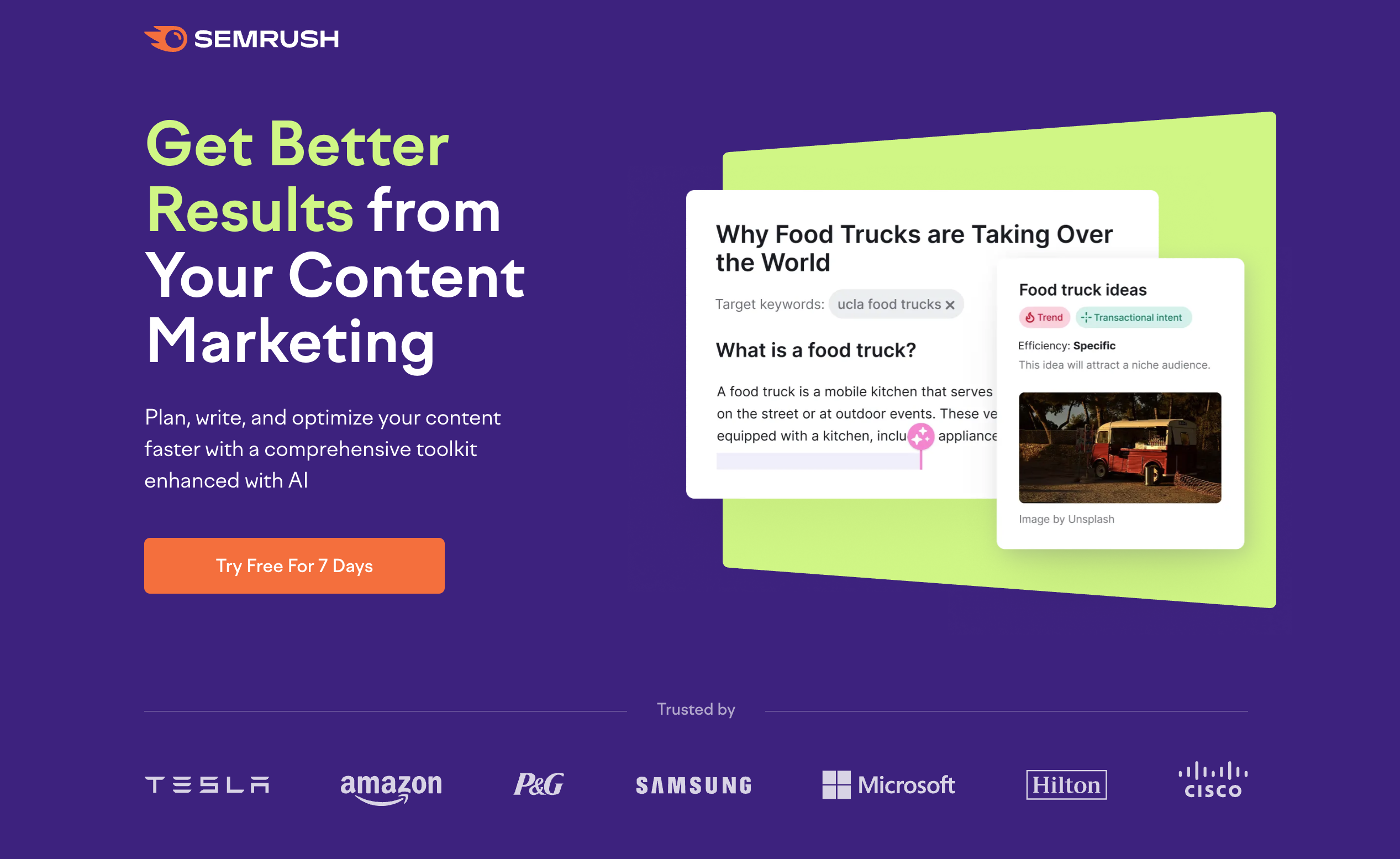
Semrush is a well-known SEO suite that recently added GEO features to its platform. Its new GEO module (in beta for enterprise users) layers AI search data on top of Semrush’s existing keyword and competitive tools.
In practice, Semrush’s GEO tools monitor AI-powered Google features (like SGE snippets and AI Overviews) and other engines.
You get visibility metrics for your domain in generative search results, plus competitive comparisons (e.g. who is cited by ChatGPT for your keywords).
Semrush leans on its massive data sets: it can cross-reference traditional Google rankings with AI answer data. The interface is similar to existing Semrush dashboards, making it easy for SEO teams to adapt.
Use cases:
- Best for digital marketing teams already using Semrush for SEO; they can add AI monitoring without jumping platforms.
- Useful for monitoring how Google’s AI search features cite your content.
- Primarily focused on Google’s ecosystem.
- It tracks Google Gemini/SGE answers and the new Google AI Overviews.
- It does not natively monitor ChatGPT or Claude, but Semrush’s keyword tools can be extended via custom APIs.
Tool Snapshot:
- Best For: SEM and SEO teams managing both traditional and AI search.
- Platform Type: SaaS (part of Semrush suite).
- GEO Use Case: AI visibility tracking within Google’s search ecosystem (e.g. SGE/Overviews); competitive AI analysis.
- Price: Semrush starts at $120/month (Pro) for basic SEO; GEO features require Business/Enterprise plans (pricing starts ~$450/month).
- Free Plan: No (limited free tools only).
- Website: semrush.com
2. AthenaHQ
AthenaHQ is a comprehensive GEO monitoring & optimization platform built by former Google and DeepMind engineers.
It gives brands a “360-degree view of how customers discover your brand across AI platforms”. AthenaHQ continually scans generative engines (ChatGPT, Perplexity, Claude, Google SGE/Gemini, etc.) to see where and how your brand appears.
It tracks which queries mention you, which answers cite your content, and how sentiment around your brand shifts.
The tool also surfaces missed opportunities: queries where your brand should appear but doesn’t. Unique features include an AI-driven Action Center that generates specific recommendations (e.g. content rewrites or schema improvements) to boost citations.
As AthenaHQ notes, the platform combines monitoring with action, which is “particularly valuable for brands serious about maintaining visibility as traditional search traffic declines”.
Use cases:
- Ideal for B2B and large enterprise brands that need to manage AI presence across multiple departments or product lines.
- Marketing teams use AthenaHQ to ensure critical pages and products get cited by ChatGPT/Gemini answers.
- PR teams use it to track brand mentions in AI forecasts.
- Development teams use its agent analytics to check that site code is crawlable by AI bots.
- AthenaHQ supports leading generative engines.
- It can simulate queries on ChatGPT (and ChatGPT-4o), Google Gemini (SGE), Anthropic’s Claude, Perplexity, Mistral, Meta’s LLaMA, and others.
- It ingests data via APIs and its own crawlers. It also integrates with traditional SEO tools (e.g. Google Analytics) for unified reporting.
Tool Snapshot:
- Best For: Large brands and agencies needing end-to-end AI search visibility.
- Platform Type: SaaS (web dashboard, no installation).
- GEO Use Case: Brand monitoring, citation tracking, and optimization recommendations across LLMs.
- Price: From ~$400/month (Lite plan) to $900/month (Growth); enterprise plans custom.
- Free Plan: No, but demo/free trial available.
- Website: athenahq.ai
3. Profound: GEO Platform
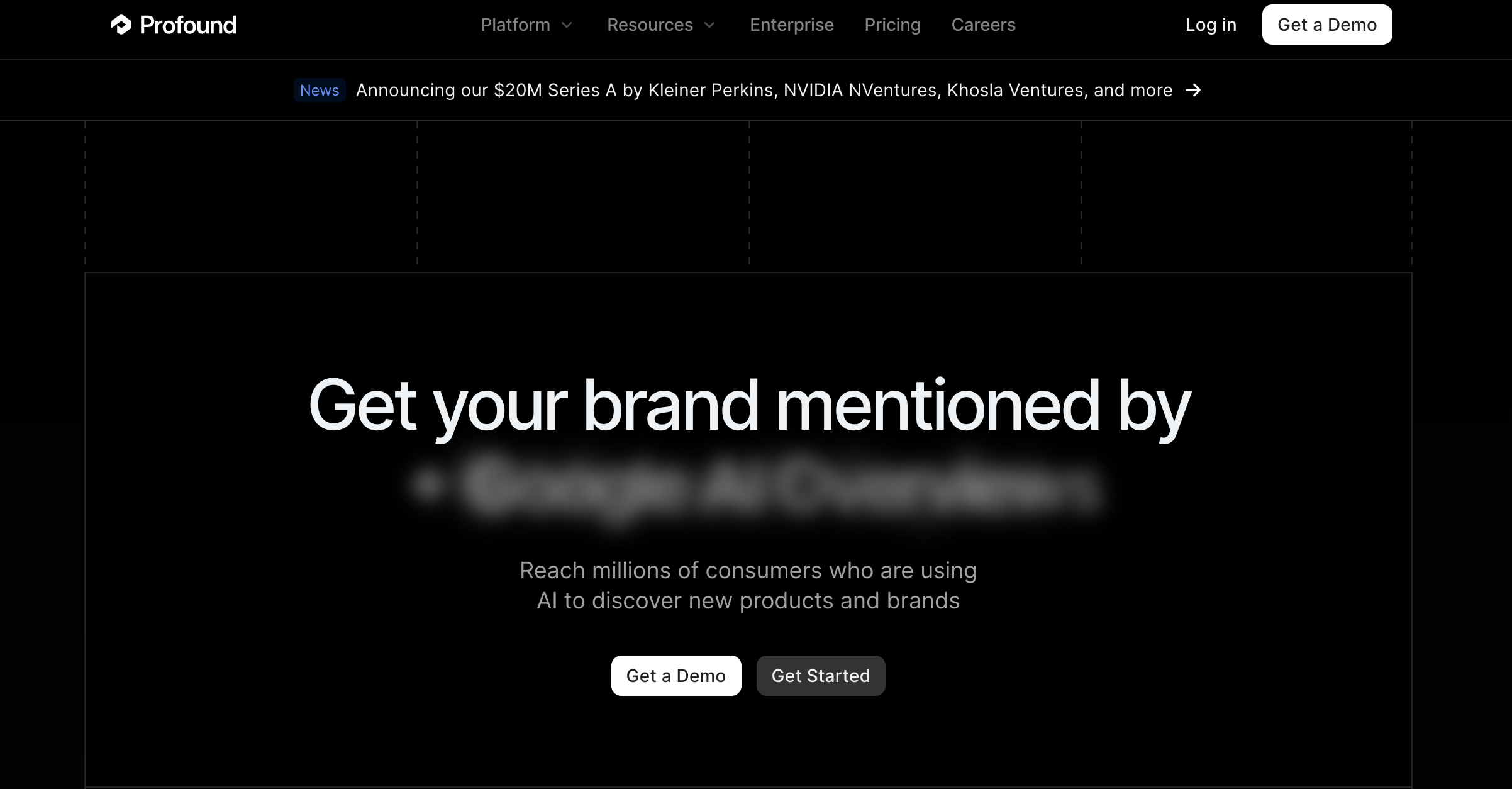
Profound is one of the early full-featured GEO platforms targeted at enterprise customers. It provides very detailed analytics on AI search presence.
Its dashboard tracks how often your brand and products are mentioned in AI-generated answers, and even analyzes the context of those mentions.
Key features include conversation analytics (showing which topics and questions lead to your mentions), proactive crawler guidance (ensuring your site is AI-indexable), and sentiment analysis of AI answers.
Profound’s design is geared to big organizations: it supports multiple languages and brands, with SOC-2 security and single sign-on.
However, it’s pitched at companies with large content volumes; as one review notes, Profound is “designed for enterprise-level clients” with a premium price tag.
Use cases:
- Global enterprises and media publishers with vast websites.
- Use Profound to audit AI “crawlability” and pinpoint how LLMs use your content. PR teams use its reports to prove AI-driven reach.
- Profound connects to major LLMs (ChatGPT, Google AI, Perplexity, etc.) via its own data feeds.
- It can ingest your content APIs and logs to improve AI indexing.
Tool Snapshot:
- Best For: Multinational enterprises, news/media companies, global brands.
- Platform Type: SaaS (enterprise platform).
- GEO Use Case: AI crawlability auditing, deep visibility tracking, cross-language support.
- Price: Custom enterprise pricing (by consultation).
- Free Plan: No.
- Website: tryprofound.com
4. Peec AI for Monitoring LLMs
Peec AI is a GEO monitoring tool with a focus on simplicity and affordability. It provides clear metrics on your brand’s visibility and citations across various AI models. Its dashboard shows how often your content appears in ChatGPT answers, what rank you hold in Perplexity results, and more.
Peec is built to be user-friendly: it presents data in charts and tables that non-technical marketers can interpret. It supports competitive benchmarking, letting you compare your AI visibility against rivals.
For example, you can see if a competitor’s page is cited more frequently in AI answers. According to NoGood, Peec is “ideal for small-to-medium businesses and marketing agencies,” with an interface that’s “easy to use” and “user-friendly”.
Use cases:
- Small/medium brands, startups, and agencies.
- Use Peec to get a snapshot of your AI presence without a steep learning curve. Good for quarterly reporting and quick audits.
- Peec connects to major LLM APIs and also monitors Google’s AI snippets.
- It covers ChatGPT, Claude, Perplexity, and other popular AI tools. Data can be exported via CSV/API.
Tool Snapshot:
- Best For: SMBs, agencies, and teams new to GEO.
- Platform Type: SaaS.
- GEO Use Case: Visibility metrics, citation tracking, competitor benchmarking across LLMs.
- Price: From about €120/month (with 14-day free trial).
- Free Plan: No.
- Website: peec.ai
5. Rankscale for AI Search Optimization
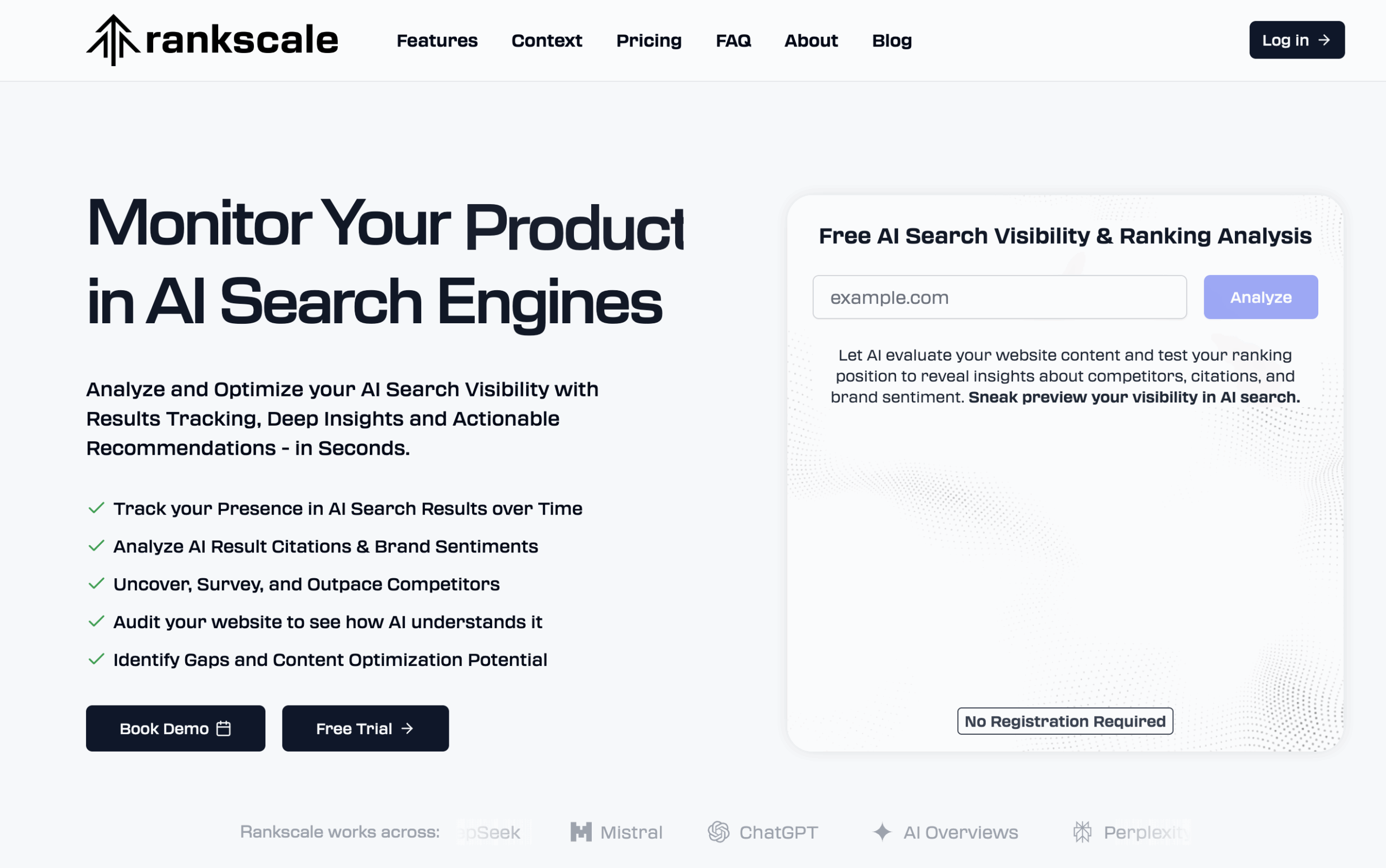
Rankscale is an all-in-one AI SEO and GEO tool that combines monitoring with optimization. It is built around an “AI search engine simulator” that lets you test how your content performs on different LLMs.
For example, you can input a query and see how ChatGPT, Gemini, and other models rank the results including your page.
Rankscale also offers prompt tracking: you can run sets of search prompts across multiple AI platforms and track your position. The tool provides on-page recommendations (similar to SEO tools) but tailored for AI visibility (e.g. entity mentions, summary strength).
According to one review, Rankscale “is a GEO tool designed to be an all-in-one solution for AI search visibility”. It’s still relatively new and primarily crowdsourced by early adopters, but it’s growing rapidly.
Use cases:
- Tech-forward brands and SEO teams who want hands-on AI testing.
- Content creators can use it during drafting to check if their answer will be noticed by ChatGPT.
- Growth teams can monitor weekly ranks across LLMs.
- Supports any LLM with an API (ChatGPT/GPT-4o, Google Gemini, Claude, Mistral, Llama, etc.)
- Also tracks Google’s AI features.
Tool Snapshot:
- Best For: Marketing teams wanting hands-on AI testing.
- Platform Type: SaaS (web app).
- GEO Use Case: Prompt performance tracking, multi-model rank analysis, on-page entity/semantic optimization.
- Price: Custom pricing (currently in beta/testing phase).
- Free Plan: No (may offer trial period).
- Website: rankscale.ai
6. Otterly for GEO & Tracking
![]()
Otterly (from Vienna) is a GEO tool centered on link and mention tracking in AI outputs. It continuously scans ChatGPT, Google’s AI summaries, and Perplexity to find where your domain or pages are cited.
Its core dashboard highlights brand mentions and link citations by AI, showing whether they are positive or negative (sentiment).
Otterly also includes useful add-ons: a prompt generator (to experiment with different queries), country-specific monitoring (track queries by region), and weekly automated reports.
It’s especially beginner-friendly: as one review notes, Otterly is “intuitive and accessible,” making it “particularly suitable for smaller businesses and startups”.
In addition to monitoring, Otterly provides basic content recommendations (e.g. which keywords to emphasize) but is primarily a tracking tool.
Use cases:
- Small teams that need basic GEO insights.
- Good for SEO novices who want to see when their site is mentioned by AI.
- Can supplement SEO audits with AI-specific insights.
- Covers the main AI search channels: ChatGPT/GPT-4o, Google AI (SGE/Overviews), Perplexity
- Data can be filtered by country
Tool Snapshot:
- Best For: Small businesses and beginners.
- Platform Type: SaaS (web dashboard).
- GEO Use Case: AI brand mention and link tracking; prompt testing.
- Price: Starts at $49/month (Standard plan for 10 prompts); free tier available (limited prompts).
- Free Plan: Yes (limited usage).
- Website: otterly.ai
7. Knowatoa for ChatGPT Rankings
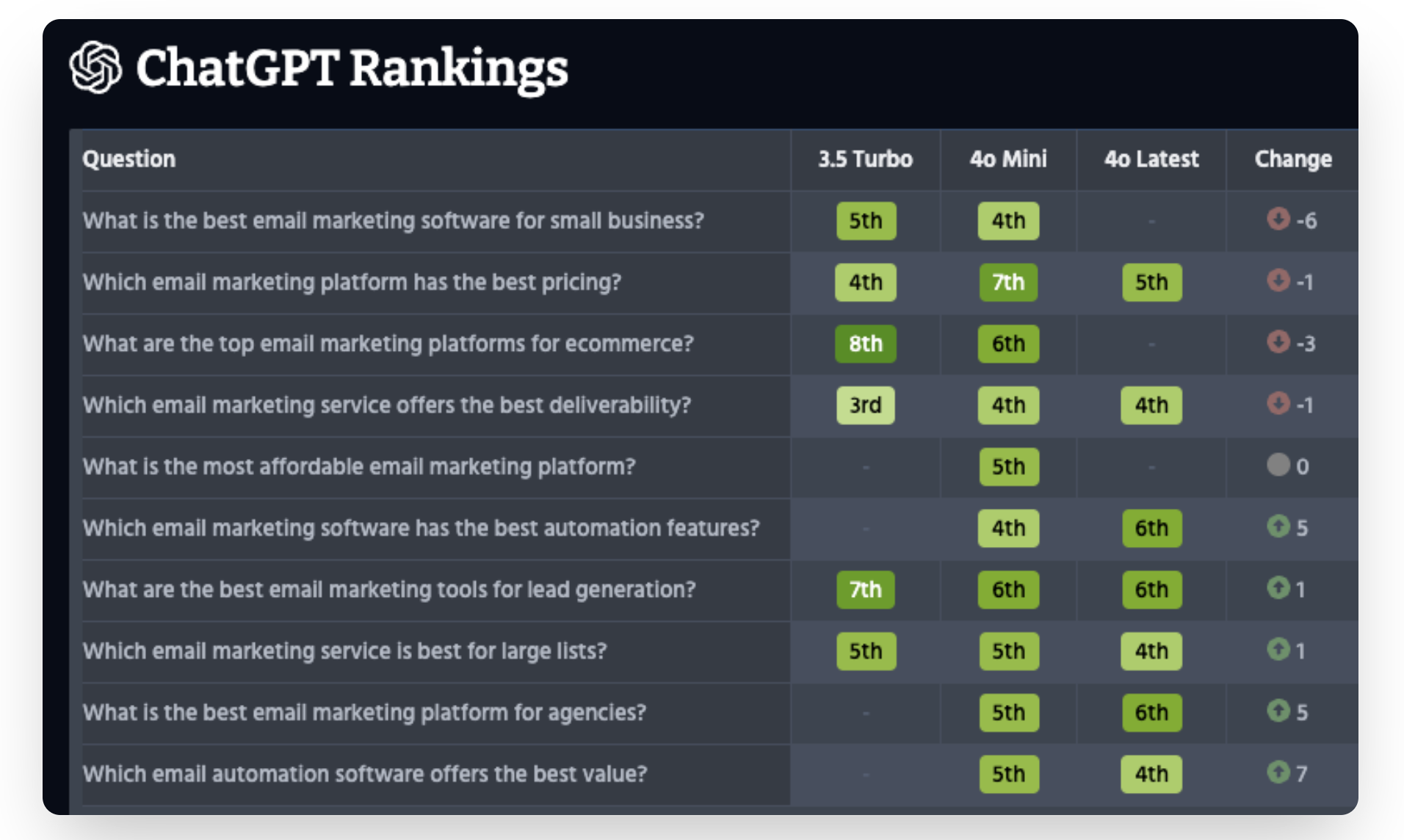
Knowatoa is one of the many GEO platforms with a strong focus on search rank tracking for AI models.
It monitors how often your brand and keywords appear in ChatGPT answers, Perplexity results, Claude responses, and Google’s AI Overviews.
One unique aspect is that it adapts traditional SEO rank-tracking logic for AI: it can automatically check if you rank in the top answers of each AI search, and track historical changes.
According to its profile, Knowatoa “enhances brand visibility across various AI-driven search technologies (ChatGPT, Claude, Perplexity, Google’s AI Overviews) by tracking traditional search patterns and applying them to AI models”.
The platform also highlights competitor rankings, showing where rivals outperform you in AI answers.
Another strength is its error-detection: it identifies technical issues like AI bots being blocked or content behind paywalls that reduce AI visibility. Overall, Knowatoa is about AI rank monitoring with competitive insights.
Use cases:
- Brands and agencies that want SEO-style tracking in AI search.
- Useful for digitally savvy teams that want to extend keyword tracking to ChatGPT/Gemini etc.
- Supports major AI tools (ChatGPT, Claude, Gemini, Perplexity, Meta Llama, etc.).
- It runs automated rank-checks (similar to keyword trackers).
Tool Snapshot:
- Best For: SEO and marketing teams extending rank tracking to AI.
- Platform Type: SaaS.
- GEO Use Case: AI keyword ranking and brand presence tracking across LLMs.
- Price: Plans start at ~$49/month (Pro tier) after free trial.
- Free Plan: Yes (free trial with limited queries).
- Website: knowatoa.com
8. Geordy.ai for LLM Schema & Markup
Geordy.ai approaches GEO by automating content formatting for AI. Its core function is to transform your existing webpages into AI-friendly formats.
For example, Geordy can automatically generate JSON-LD schema, reformat sections into concise bullet lists, and adjust metadata so that LLMs can more easily parse and cite the content. It also claims to create “AI-first” versions of articles – essentially repackaging content with AI visibility in mind. In practice, you point Geordy at a URL and it outputs an updated version optimized for indexing by Google SGE or other AI systems.
This addresses the often-overlooked “last mile” of SEO: making sure the AI crawler actually understands your page. The tool advertises “precise, automatic, and AI-first indexing” as a feature.
Use cases:
- Content-heavy sites (blogs, documentation) where manual GEO would be too laborious.
- It’s used by content teams to “GEO-ready” large site portfolios quickly.
- Primarily focused on Google SGE compatibility; also helpful for general LLM-readiness (ChatGPT can ingest schema).
- Output can be reviewed before publishing.
Tool Snapshot:
- Best For: Content-heavy organizations (news, blogs, documentation sites).
- Platform Type: SaaS/API.
- GEO Use Case: Automated on-page GEO – schema markup, entity tagging, AI-friendly formatting.
- Price: $900/month (Growth plan); also offers $400/month Lite plan.
- Free Plan: No.
- Website: geordy.ai
9. KAI Footprint
KAI Footprint is a newcomer (2024) offering free AI search analytics for brands. It positions itself as a “brand report” tool for generative search.
With KAI Footprint, you enter your company name, and it queries multiple LLMs (ChatGPT, Perplexity, Google AI, DeepSeek, etc.) to see how your brand is represented.
It measures visibility (how often you appear in AI answers) and sentiment. It then compiles this into an easy-to-read report and score.
Basic features are free (including one report per brand); paid plans (starting ~$99/month) unlock API access and ongoing tracking. Unlike most paid GEO tools, KAI emphasizes community learning – it offers a newsletter and free guides on GEO. In essence, KAI Footprint is an entry-level visibility checker for AI search.
Use cases:
- Startups, SMBs, or those new to GEO.
- Ideal for a quick health check on whether your brand is showing up on ChatGPT/Perplexity and how it scores.
- Covers multiple AI engines.
- Supports custom searches by brand and keyword.
Tool Snapshot:
- Best For: Companies wanting a free or low-cost GEO checkup.
- Platform Type: SaaS (web app).
- GEO Use Case: One-off or periodic brand visibility reports in AI search.
- Price: Free (basic brand report); $99/month for ongoing tracking and custom reports.
- Free Plan: Yes.
- Website: kaifootprint.com
10. HubSpot AI Search Grader
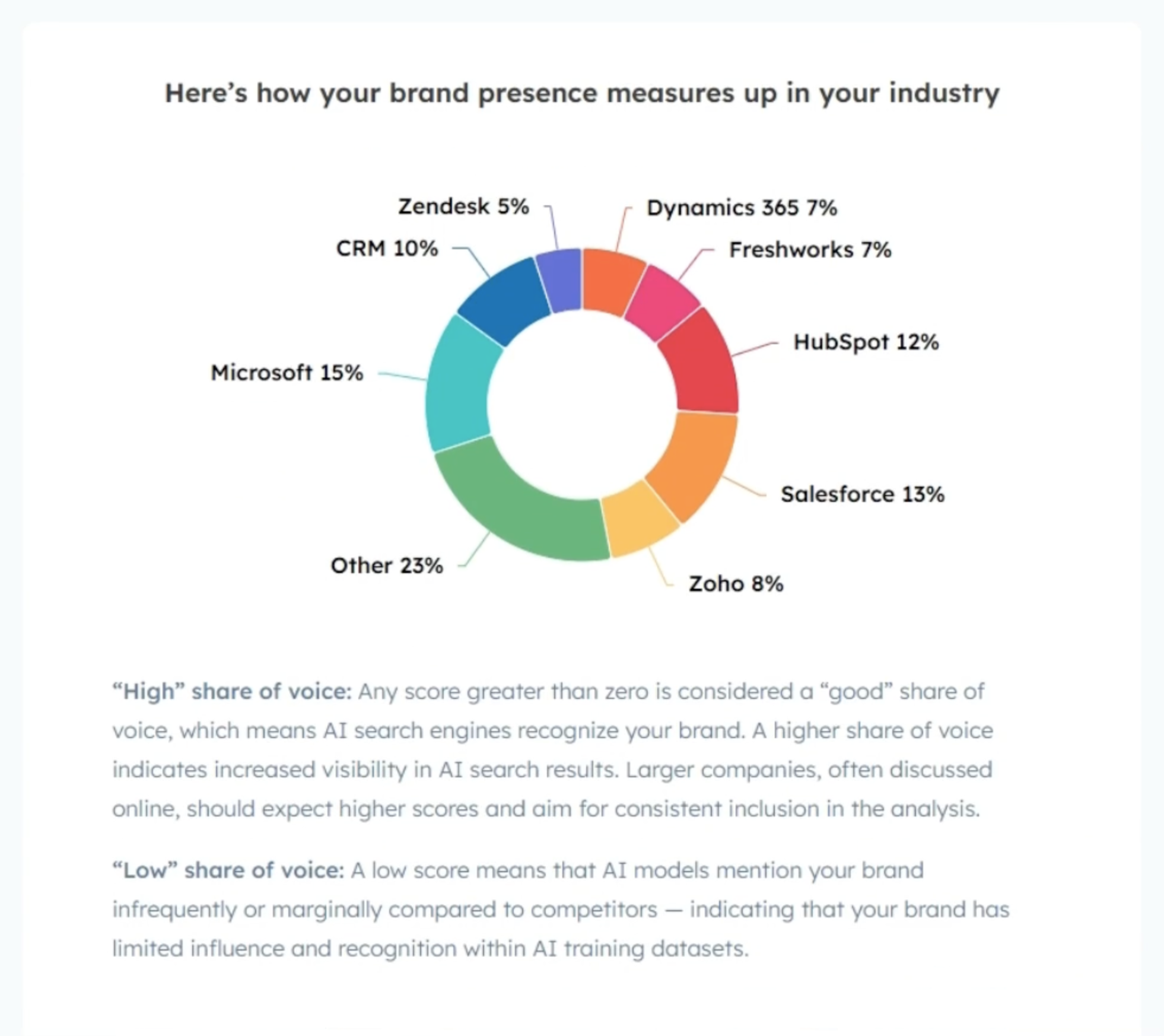
HubSpot’s AI Search Grader (launched 2023) is a free, entry-level GEO tool focused on content auditing.
It scans your website or specific pages against ChatGPT, Perplexity, and Gemini (Google’s Chat AI) to evaluate how well your content aligns with AI search expectations.
It provides a score and shows “brand sentiment and share of voice” relative to competitors. While not as comprehensive as other platforms, it’s a quick way to spot glaring issues. For instance, it highlights if your content lacks conversational format or if certain keywords are missing.
HubSpot touts it as a way to identify “strengths and opportunities to boost brand awareness and sentiment” in AI search. Unlike other HubSpot tools, this grader is free (though requires filling a form to get the full report).
Use cases:
- Inbound marketers and content teams on a budget.
- Great for a first audit of how ChatGPT and Gemini “see” your content.
- Can be used periodically after content updates.
- Focused on LLMs: ChatGPT/GPT-4o, Perplexity.ai, and Google’s Gemini.
- It uses sample queries to gauge presence. Results can be downloaded or emailed as a PDF.
Tool Snapshot:
- Best For: SMBs and content teams needing a free GEO assessment.
- Platform Type: SaaS (website).
- GEO Use Case: Brand visibility grading and content recommendations for AI search.
- Price: Free (no signup required for basic scan).
- Free Plan: Yes (entire tool is free).
- Website: hubspot.com/ai-search-grader
11. DemandSphere Visual Rank
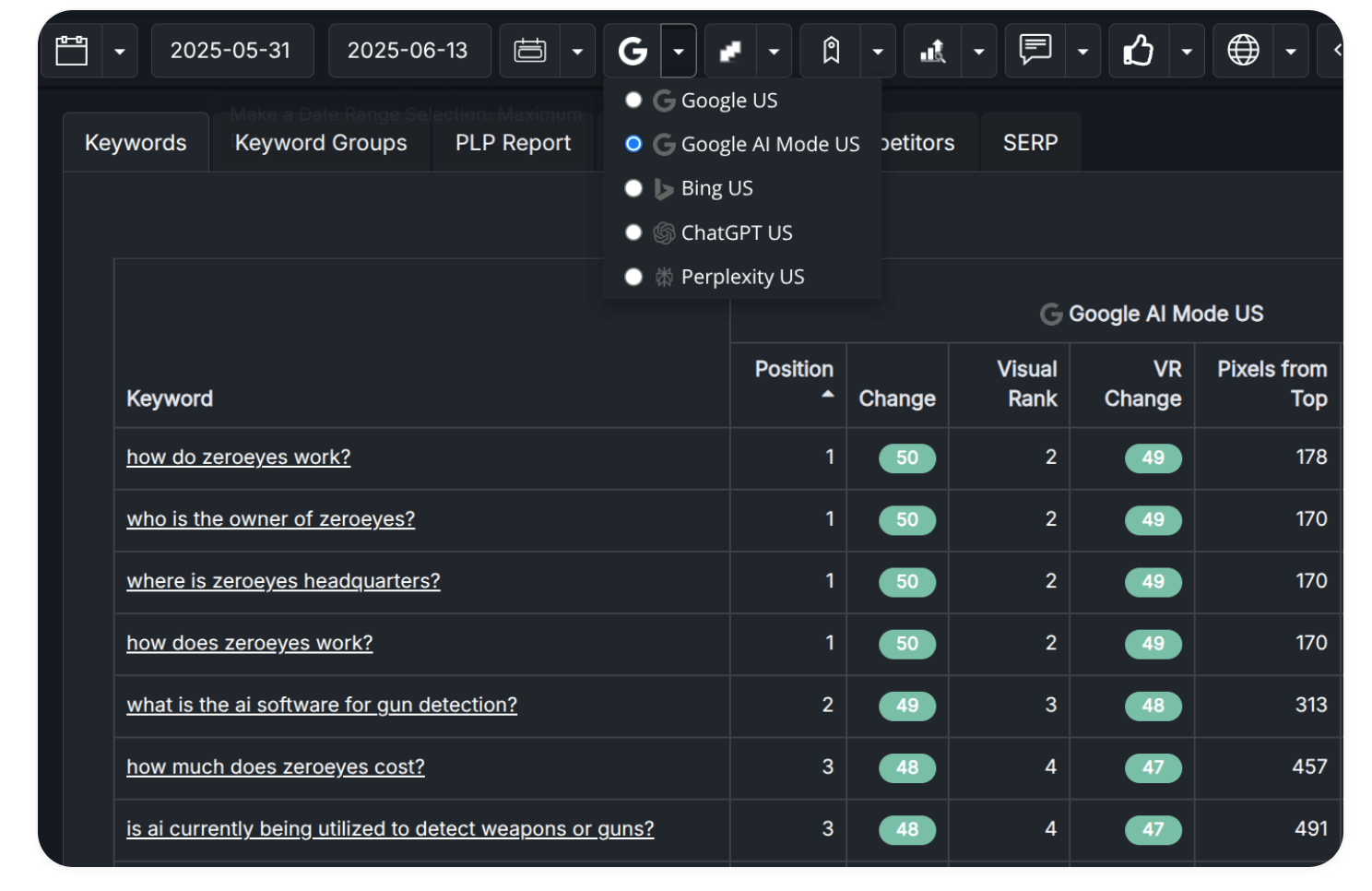
DemandSphere’s Visual Rank is a cutting-edge SEO and GEO visibility tool (launched prior to 2025) that goes beyond tracking positions to measure Search Engine Visibility based on pixel-depth per device. This reveals how far users scroll before seeing your content and how rich SERP features push your listing down—giving a far more accurate view of click-through potential .
It complements Visual Rank with CTR Lab, which empowers teams to build custom click-through models using their own Google Search Console data. It’s not just industry averages which gives you more accurate forecasting and visibility planning. While not a free tool, DemandSphere offers a 14‑day free trial (credit card required). After that, pricing starts at approximately $500/month per feature, with plans tiered by keyword volume—from Analyst up to Enterprise tiers.
Use cases:
- SEO and content teams needing to understand actual visibility—not just rankings.
- Forecast-driven analysts building KPIs from real CTR and pixel-depth data.
- Optimization for AI-powered search environments (like ChatGPT, Gemini, Perplexity).
- Post-publishing checks to ensure content is in-view, despite SERP disruptions.
Tool Snapshot:
- Best For: Mid-market to enterprise SEO/content teams wanting precise visibility & CTR forecasting.
- Platform Type: Web-based SaaS.
- GEO Use Case: Visibility scoring and forecasting with AI/LLM search context.
- Price: Free trial; paid plans begin at ~$500/month per feature.
- Free Plan: 14‑day trial (credit card required).
- Website: demandsphere.com
The Bottom Line
Each of these tools addresses a different slice of the AI search optimization puzzle. Some focus on brand mentions and citations (AthenaHQ, Otterly, Hall), others on content and schema optimization (Geordy, Alli AI), and still others on workflow integration with existing SEO practices (Semrush, MarketMuse).
As AI assistants become our first stop for information, integrating one or more of these GEO tools into your strategy will be crucial.
They provide the visibility, metrics, and guidance needed to ensure your content is not only crawled by AI models but also trusted and cited in the answers they generate.







